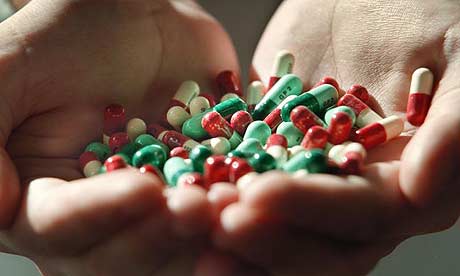
Britain is turning into a nation of pill-poppers as people become increasingly unwilling to tolerate even the slightest discomfort, according to new research.
The study finds that, in the past two decades, the number of prescribed medicines dispensed per person has risen from eight a year to more than 16. Its author, Professor Joan Busfield, said the age of "stoicism" was dead and claimed that Britain was becoming more like France, with its "long-established tradition of taking medicines to heal problems".
In her paper, A Pill for Every Ill, which is published in the current Social Science & Medicine, Busfield lays part of the blame on the pharmaceutical industry. She finds evidence of:
■ "disease-mongering", with some companies helping to construct new disease categories to expand their markets;
■ industry researchers who ghost-write papers before persuading academics to put their names to them;
■ drug companies "intensively marketing" to doctors by sponsoring conferences, turning up at surgeries with free samples and giving away pens, mugs and Post-it notes.
Busfield, who is professor of sociology at the University of Essex, talks of the industry's "control of the science", with evidence that trials sponsored by drug companies tend to deliver more favourable results. As for doctors, "even small gifts" influence behaviour, she said. "Doctors have not generally acted as a significant countervailing power in relation to the industry and have largely played the role of handmaiden to its expansionary endeavours."
Busfield argued that doctors were tempted to prescribe unnecessarily because they wanted to help patients and to avoid risk. But the general population was also to blame: "Patients are more demanding than they were. The old idea of being deferential and accepting what you are told has gone."
In terms of the explosion of drugs, she pointed to statins (which lower cholesterol) and antidepressants, but added that the problem was across the board. As for new categories that are now seen as diseases, she mentioned high cholesterol, osteoporosis, sexual dysfunctions and attention deficit hyperactivity disorder (ADHD).
Busfield added: "I think drugs are being overused. The population is getting healthier and healthier, longevity is increasing, but we are using more and more drugs."
Michael Summers, vice-chairman of the Patients Association, agreed. "We are being over-medicated these days. We are getting close to the 'pill for every ill' society. The old stoicism has disappeared.
"The greater availability of drugs via the internet and from pharmacies means more people go out and seek them," added Summers.
Richard Taylor, a doctor who became independent MP for Wyre Forest in 2001 after campaigning on hospital closures, said he wanted to see a culture shift: "We have grown up with a belief that the NHS is there to be used and I think we have got to retrain people that the NHS is there if you need it."
Professor Steve Field, chairman of the Royal College of General Practitioners, pointed to other reasons for the rise in drug use. "Until the 1980s, for example, duodenal ulcers were treated by surgery. But the infection that causes it is now treated by drugs. Similarly, treatment of people with asthma using inhalers has improved the quality of life of patients, reduced hospital admissions and deaths. Statins have reduced the number of heart attacks and led to patients living longer, healthier and more productive lives. So prescribing isn't such a bad thing."

